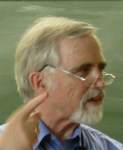
Rudolf Wille
Encyclopedia

Germany
Germany , officially the Federal Republic of Germany , is a federal parliamentary republic in Europe. The country consists of 16 states while the capital and largest city is Berlin. Germany covers an area of 357,021 km2 and has a largely temperate seasonal climate...
Mathematician
Mathematician
A mathematician is a person whose primary area of study is the field of mathematics. Mathematicians are concerned with quantity, structure, space, and change....
and was Professor of General Algebra from 1970 to 2003 at Technische Universität Darmstadt (TU Darmstadt)
Darmstadt University of Technology
The Technische Universität Darmstadt, abbreviated TU Darmstadt, is a university in the city of Darmstadt, Germany...
. His most celebrated work is the invention of Formal concept analysis
Formal concept analysis
Formal concept analysis is a principled way of automatically deriving an ontology from a collection of objects and their properties. The term was introduced by Rudolf Wille in 1984, and builds on applied lattice and order theory that was developed by Birkhoff and others in the 1930s.-Intuitive...
, a supervised machine learning technique that applies mathematical lattice theory to organize data based on objects and their shared attributes.
Wille is an accomplished musician and has also made contributions to Mathematics in Music, Mathematical Pedagogy and the Philosophy of Science. Now officially retired, Wille continues to play an active leadership role in the concept lattice research community.
Wille has been a member of the Board of Directors of the Institute for Philosophy at TU Darmstadt since 1976. From 1983, he has been leader of the research group on Formal concept analysis
Formal concept analysis
Formal concept analysis is a principled way of automatically deriving an ontology from a collection of objects and their properties. The term was introduced by Rudolf Wille in 1984, and builds on applied lattice and order theory that was developed by Birkhoff and others in the 1930s.-Intuitive...
and since 1993 Chairman of the "Ernst Schröder Center for Conceptual Knowledge Engineering". Wille is also a founding member of the Center for Inter-Disciplinary Research in Darmstadt and maintains a footprint in other research groups around the world as a visiting consulting/scholar (such as KVO).
Wille's research interests include algebra, order and lattice theory, foundations of geometry, discrete mathematics
Discrete mathematics
Discrete mathematics is the study of mathematical structures that are fundamentally discrete rather than continuous. In contrast to real numbers that have the property of varying "smoothly", the objects studied in discrete mathematics – such as integers, graphs, and statements in logic – do not...
, measurement theory, mathematics in music, philosophy of science, conceptual knowledge engineering and contextual logic.
A significant international community of researchers follow Wille's work on Formal concept analysis
Formal concept analysis
Formal concept analysis is a principled way of automatically deriving an ontology from a collection of objects and their properties. The term was introduced by Rudolf Wille in 1984, and builds on applied lattice and order theory that was developed by Birkhoff and others in the 1930s.-Intuitive...
, the main forums being the International Conferences on Formal Concept Analysis (ICFCA), Conceptual Structures (see also Conceptual graphs) (ICCS) and Concept Lattices and their Application (CLA
CLA
CLA may refer to:* California Library Association, see California Writers Club* Canadian Lacrosse Association* Canadian Library Association* Caprivi Liberation Army* Carry Look-Ahead Adder...
) conferences. The first two are published in the Lecture Notes in Computer Science
Lecture Notes in Computer Science
Lecture Notes in Computer Science is a series of computer science books that has been published by Springer Science+Business Media since 1973....
and the latter is a multi-stage conference that produces journal papers.
A leader, inter-disciplinarian, peace activist and prolific mentor, Wille has overseen more than 100 German "Diplom- und Staatsexamenarbeiten" in Mathematics, 51 PhD dissertations, and 8 Postdoctoral "habilitation" qualifications.
Work
Wille has authored more than 250 scientific publications and co-authored the highly cited and influential textbook on Formal concept analysisFormal concept analysis
Formal concept analysis is a principled way of automatically deriving an ontology from a collection of objects and their properties. The term was introduced by Rudolf Wille in 1984, and builds on applied lattice and order theory that was developed by Birkhoff and others in the 1930s.-Intuitive...
with his long time collaborator (and former PhD student) Bernhard Ganter who is now Professor of Mathematics at TU Dresden:
B. Ganter, R. Wille: Formal Concept Analysis: Mathematical Foundations, Springer-Verlag, 1999.
External links
- Ernst Schröder Zentrum
- Rudolf Wille's page at The Mathematics Genealogy Project
- ICCS
- ICFCA
- CLA
- KVO

